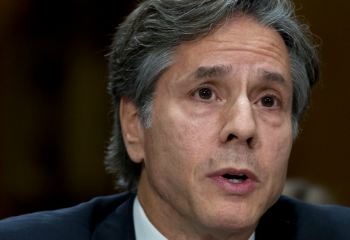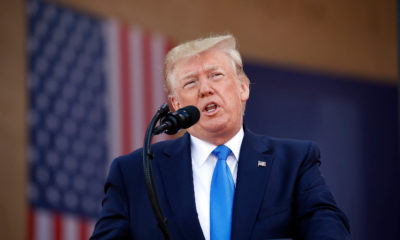World
Donald Trump, Melania attend 3 inaugural balls
 Washington: Donald Trump and his wife, Melania, attended three official inaugural balls on Friday night following his swearing-in as the 45th President of the US. The first was the Liberty Ball held was attended by supporters who donated to the inauguration or purchased tickets, the New York Times reported. The First Couple made their entry amid applause. Melania was dressed in an ivory evening gown by designer Herve Pierre with a white ruffle cascading down the front while Trump was in a tuxedo and bow-tie. On stage, Trump said they had managed to win despite widespread doubt. “We did it,” he said, exchanging a smile with his wife.
Washington: Donald Trump and his wife, Melania, attended three official inaugural balls on Friday night following his swearing-in as the 45th President of the US. The first was the Liberty Ball held was attended by supporters who donated to the inauguration or purchased tickets, the New York Times reported. The First Couple made their entry amid applause. Melania was dressed in an ivory evening gown by designer Herve Pierre with a white ruffle cascading down the front while Trump was in a tuxedo and bow-tie. On stage, Trump said they had managed to win despite widespread doubt. “We did it,” he said, exchanging a smile with his wife.
“We began this journey and they said we didn’t have a chance but I knew we would win,” Efe news reported citing the President as saying. The couple then shared their first dance as the White House’s new tenants to Frank Sinatra’s “My Way”. Vice President Mike Pence and his wife Karen, as well as the couples’ children joined them on the stage. Nine pairs in all swayed about by the song’s end, the Washington Post reported.
Minutes later, they repeated the ritual at the Freedom Ball. There, Trump addressed the crowd, declaring “We will not be taken advantage of anymore” and even asking the audience “should I keep the Twitter going? It’s a way of bypassing dishonest media.” After the dance, Trump pumped his fist to lead the crowd in a chant of “USA!”
Liberty Ball was followed by the Freedom Ball also held at the Walter E. Washington Convention Centre. The last was the Armed Services Ball, at the National Building Museum, had a restricted audience of only active duty and reserve military members, wounded veterans, emergency medical workers and Medal of Honour recipients. The President addressed the crowd, saying, “You’re amazing people, and I like you for a lot of reasons.”
“And I also like the fact you all voted for me, right? You all voted for me,” he said. Here, Trump had a video call with US troops located in Afghanistan’s Bagram Airbase. The airbase personnel took turns congratulating Trump on his victory. Melania Trump also addressed the crowd. “Thank you all for your service,” she said. “I’m honoured to be our First Lady. We will win. And we will make America great again.” The First Couple danced to a rendition of “I Will Always Love You.” Then, per tradition, they danced with service members. Since 1809, inaugurations of US presidents have been accompanied by these traditional dances, becoming one of the biggest social galas for political leaders across the country.
World
Lockdowns in China Force Urban Communities to Defy Censorship and Vent Frustration Online

Shanghai’s rich middle class is leading a wave of online dissent over the strict and prolonged lockdowns imposed in various parts of the country. Chinese internet censorship is struggling as patience is wearing thin in many urban centers, coming up with creative forms of online protests.
Social Media Posts Revealing Lockdown Tension in Shanghai
Drawn-out lockdowns are nothing new in China as authorities insist with the nation’s zero-Covid policy since the start of the pandemic. Currently over This time around, however, metropolitan areas like Shanghai are increasingly difficult to keep quiet, given that its more than 25 million residents have seen weeks of total isolation along with food shortages and many other service interruptions.
Dozens of towns and reportedly over 300 million Chinese citizens have been affected by lockdowns of different severity. As expected, urban netizens have been most outspoken over their difficulties by finding creative ways to get around state censorship and bans placed on topics, news comments and spontaneous campaigns.
Shanghai residents have been using mobile proxies and hijacking seemingly unrelated hashtags to talk about healthcare issues, delivery failures and the overall severity of their situation. The “positive energy” that the Chinese government wants to transmit during the recent prolonged series of lockdowns does not come naturally to those counting food supplies and online censors are working hard to filter words, trending topics and undesired social media sharing.
WeChat groups and message threads are under constant monitoring. Posts questioning the zero-Covid approach have been quickly deleted, including by leading Chinese health experts like Dr. Zhong Nanshan. Video footage is soon censored and protests and investigations are quickly made to disappear.
Where this has not worked, officials have exposed banners with warnings and outright threats like “watch your own mouth or face punishment”, while drones have been patrolling the city skies. Yet, if anything, this has led to further tensions and unspoken confrontation with Shanghai’s educated and affluent middle class.
Creative Online Solutions Harnessing Civic Energy
Announcements by Chinese social media that they would be publishing the IP addresses of users who “spread rumors” have not helped either. Tech industry research has shown that much of Asia’s tech-savvy population has a habit of using mobile proxies and other privacy tools, quickly finding workarounds to browse the internet freely and talk to the world about the hottest topics.
The sheer volume of forbidden posts is already a challenge for the very censorship system, experts explain. Unable to track all trending hashtags, state workers overlook topics that speak about the US, Ukraine or other popular news. Linking human rights elsewhere to their situation, Chinese online dissidents establish their informal channels and “hijack” the conversation to share personal or publicly relevant information about the Covid suppression in their town.
Sarcastic and satirical posts still dominate. Others hope to evade the censors by replacing words from famous poems or the national anthem. One thing is certain – social media, when harnessed with the right creativity, has proven its ability to mount pressure on the government in even some of the most strictly controlled tech environments like China.























